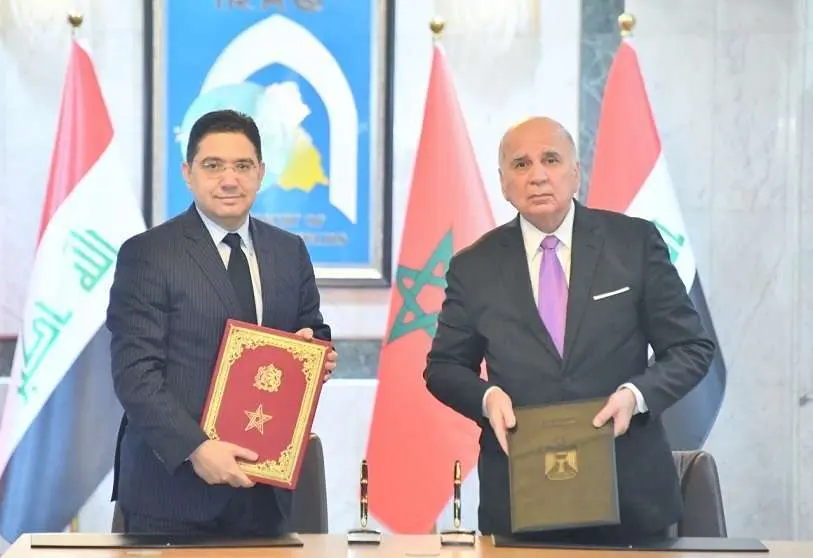Nasser Bourita amplía el radio de la política exterior de Marruecos

Nasser Bourita wants to broaden the radius of Morocco's foreign policy. With this objective in mind, the head of Moroccan diplomacy embarked on a tour of Iraq, Bahrain and Oman over the weekend. It was a busy schedule aimed at winning new support for the Alawi kingdom on the Western Sahara issue, but also at reinforcing the fight against terrorism and relaunching economic cooperation with the wealthy Gulf monarchies.
Bourita landed in Baghdad on Saturday morning on the first visit by a Moroccan Foreign Minister to Iraq in 25 years. He met with his counterpart Fouad Hussein and Iraqi National Security Adviser Kassem Al-Araji, who later praised "Morocco's pioneering experience in the fight against terrorism and extremism". The Moroccan diplomat had time for talks with the Speaker of the House of Representatives, Mohamed Al-Halbouchi.
In what he described as a "historic" event, Bourita and Hussein were present at the reopening of the Kingdom's embassy in Baghdad, which had been closed for 18 years following the kidnapping by al-Qaeda of two staff members working in the compound. The event, which took place in autumn 2005, shocked Moroccan society and forced Rabat to relocate its diplomatic mission to the capital of neighbouring Jordan, Amman. The whereabouts of the two abductees remain unknown.

The reopening marks the beginning of a new phase in their relations, which cooled after the fall of Saddam Hussein's regime and the emergence of Iran as an influential player in the country. The Iraqi National Security Advisor hopes that the reestablishment of the embassy will lead to "constructive cooperation between the two countries in the fields of security, intelligence and information sharing, with the aim of eliminating terrorism and achieving stability in the region and the world".
The Foreign Ministers signed two Memoranda of Understanding at the political and economic level to synchronise their agendas in the coming months. "We are expected to agree on a roadmap for holding the necessary meetings and organising sectoral visits between the ministers concerned and economic actors," Bourita announced at a joint press conference, but did not specify dates.
For his part, Hussein, who also serves as deputy prime minister in the Iraqi government of Mohamed Shia Al Sudani, reiterated Baghdad's support for "the territorial integrity of Morocco and the efforts of the United Nations to reach a definitive solution to the Sahara issue". He repeated the same words he had already uttered in Marrakech during a bilateral meeting in May last year, in the framework of the Global Coalition Conference against Daesh.

Bourita flew from Baghdad to Manama. King Hamad bin Isa Al Khalifa was waiting for him in Bahrain. After talks with the monarch, the Moroccan Foreign Minister co-chaired with his Bahraini counterpart, Abdulatif bin Rashid Al Zayani, the fifth session of the High Joint Commission, a meeting that served for the parties to ratify their intention to work together in the sectors of industry, tourism, agriculture, health and education, according to the Moroccan state news agency MAP.
The Bahraini authorities also reiterated their support for Rabat's thesis for Western Sahara. Manama supports the autonomy plan under Moroccan sovereignty. In fact, the Gulf country opened a consulate in the Moroccan-controlled Saharan city of Laayoune at the end of 2020. The Gulf monarchy stresses that the solution put on the table by the Alawi kingdom must be in accordance with international law and the resolutions of the UN Security Council and the General Assembly.
Oman was the last stop on Nasser Bourita's tour. In Muscat he agreed with his counterpart Badr bin Hamad Al-Busaidi to hold the next session of the Joint Committee. They did not define a specific roadmap or specify dates, but assured that it would take place. For Morocco, winning the Sultanate's backing is a priority objective in the Gulf. Oman plays a crucial mediating role in the region thanks to its fluid relations with both the GCC countries and Iran.

Bourita's rapprochement with a country that is very close to Tehran, beyond its role as arbiter, is therefore striking. Morocco broke off relations with the Islamic Republic in May 2018 after accusing the Ayatollahs' regime of providing arms and logistical aid to the Polisario Front. Iran recognises the sovereignty of the self-styled Sahrawi Arab Democratic Republic (SADR) and is one of the heavyweights in the Middle East and, more specifically, in the Gulf, where Morocco wants to carve out a niche for itself.
The recent visit to the region by the head of Moroccan diplomacy may signify a premeditated attempt by Rabat to strengthen its relations with Arab states at a time when its ties with its hitherto preferred partner, the European Union, are going through a delicate period. The Qatargate bribery scandal in the European Parliament, in which Morocco has been implicated, has damaged the political and commercial ties between the Alawite kingdom and Brussels.
However, there are those in the EU capital who want to turn the tide. The head of European diplomacy, Josep Borrell, visited Rabat at the beginning of January to meet with Bourita. And on 20 February it will be the turn of the Commissioner for Neighbourhood Policy and Enlargement, Oliver Varhelyi. The European Commission is seeking to ensure that cooperation on important issues follows its usual course.









